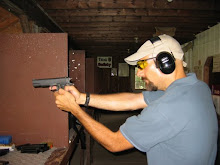The state’s highest court plans to review the constitutionality of a recently challenged state law that requires gun owners to lock their weapons, making it the first test in Massachusetts of a landmark US Supreme Court ruling that Americans have the constitutional right to own guns and stow them as they see fit.
The SJC decided to review the law less than a year after a Lowell District Court judge dismissed firearms charges against a Billerica man whose handicapped son was accused of shooting a BB gun at a neighbor and who then showed police officers where his father kept other unlocked weapons.
Oh, ain't this a fine kettle of fish? It looks like they didn't waste much time applying the ruling in Heller regarding the "safe storage" requirement to the MA requirement. Good. Locking up your firearms is the smart and safe thing to do. It shouldn't be required by law, though.
Here's something I'm having trouble with:
Harvey Silverglate, a civil liberties lawyer in Boston, who argues that the Second Amendment should apply to the states.
Does he argue that the First Amendment should apply to the state as well? No? Then he's a hypocrite. And a pretty lousy civil liberties lawyer if he's arguing against people retaining more of them...
Look, I keep my guns locked up - with two small kids in the house it just makes good sense to prevent access to firearms. Not to mention I have a significant amount of money invested in my armory, and keeping everything under lock and key presents more of a deterrent to theft than just leaving them lying around the house.
But it shouldn't get me arrested and my permit revoked because I have grandpa's old side-by-side in a glass-cased gun cabinet rather than a steel safe.
That is all.







10 comments:
'Does he argue that the First Amendment should apply to the state as well? No? Then he's a hypocrite.'
I kinda took the context to mean he was on our side. He did say:
'Others predicted that the Supreme Court would eventually narrow its ruling. “When you’re talking about rights, you don’t pick and choose,’’ said Harvey Silverglate, a civil liberties lawyer in Boston, who argues that the Second Amendment should apply to the states. “You either protect them all, or none of them are going to be safe.’’'
-SayUncle
Dunno, Unc.
I cannot reconcile how "argues that the Second Amendment should apply to the states" is on our side.
That's the same old tired "the Second Amendment means that the states can have their own militias" argument, IMHO...
@Jay, I am not sure. Incorporation of Heller and 2A for MA would mean that it would have to take Heller in toto, rather than just the parts that they like (like the lock part). I think that a full "incorporation" argument would probably mean that there would be substantial legal standing to challenge the state's AWB.
I'm (perhaps overly) optimistically hoping they're using Heller as a cudgel - i.e., strike this down or we'll use Heller to do away with ALL the shitty gun laws...
We'll see. Any improvement would be HUGE.
Jay,
Are you aware that the NRA has petitioned the SCOTUS on the topic of incorporating the 2nd under the 14th? Yep. There are two conflicting cases:
1)Nordyke: where the 9th circuit court of appeals held for incorporation
2)NRA v. City of Chicago where the 7th circuit upheld the chicago handgun ban and voted against incorporation.
The the NRA's petition to the court, they cite the Nordyke case (and others IIRC) as precident, asking that the "no incorporation" ruling by the 7th be overturned.
The NRA-ILA has the petition on their page.
Thought you should know.
-
Article VI of the Constitution states that the Constitution, laws passed by Congress, and any treaties that are ratified are the supreme law of the land, anything in the constitutions and laws of the several states to the contrary notwithstanding.
All of the amendments to the Constitution are AUTOMATICALLY applied to the states by Article VI.
The Declaration of Independence also states that we have 'unalienable' rights from our Creator. That means all people, not just Americans have these rights.
Jay, I'm pretty sure he does think the 1A applies to the states. I've never met anyone who said the states could prohibit free religion/speech/assembly.
Tai, it's not quite that simple. For the first century of the Republic's existence, the Bill of Rights was held to restrict only the federal government. States could do whatever they damn well pleased as long as it didn't explicitly violate some federal law or power. Two of the classic 2A cases date from that period -- Presser and Cruikshank, I think -- and very nasty reading they are. IIRC, Cruikshank explicitly held that a state's Jim Crow law prohibiting blacks from owning firearms was constitutional. Only after the Supreme Court developed the Incorporation Doctrine, based (very clumsily) on the 14th Amendment, did states become bound by the guarantees in the Bill of Rights.
As for the Silverglate quote, I can't tell what he means. As-is, it could be agreeing with Heller, or it could be agreeing with the old lefty interpretation of the 2nd: that the RKBA applies to the states as independent entities, not to the individual.
Wolfwalker, IIRC Cruckshank also held that the first amendment didn't bind the states. It was one of the driving forces in getting the 14th passed.
IANAL, but this actually seems like the proper procedure to me. SCOTUS construed strictly, and the states and people amended the Constitution to overturn what they saw as bad law.
Jay, I agree with Andrew. I think that there are a bunch of folks who are about to be sad pandas.
Oh, and I was patting myself on the back at how quickly I got my post about this up. Instablogging, I thought. Didn't realize you beat me by *hours*. ;-)
From an article on The Boston Phoenix blog by Silverglate.
"Let's assume, for argument's sake, that the Supreme Court majority is correct, and that the Second Amendment protects the right of the individual to possess, even to use, firearms. (This happens to be my view of the meaning of the text, but, as I'll make clear in a moment, it hardly matters with regard, ultimately, to the issue of the constitutionality of gun control legislation.) What impact would such an interpretation have on the power of federal, state, and local governments to enact legislation controlling, even limiting, the exercise of that right? Answer: very little."
Where I depart from Silverglate, not that it matters what I think, is in the term "reasonable regulation". What are the "reasonable regulations" on the First Amendment, or the Fourth or Fifth for that matter?
Post a Comment